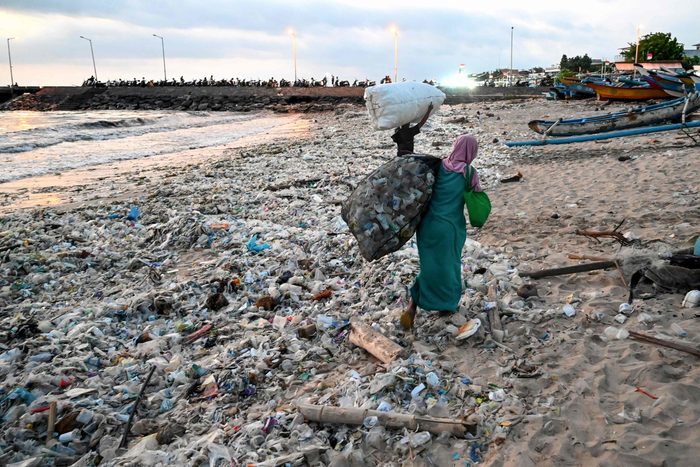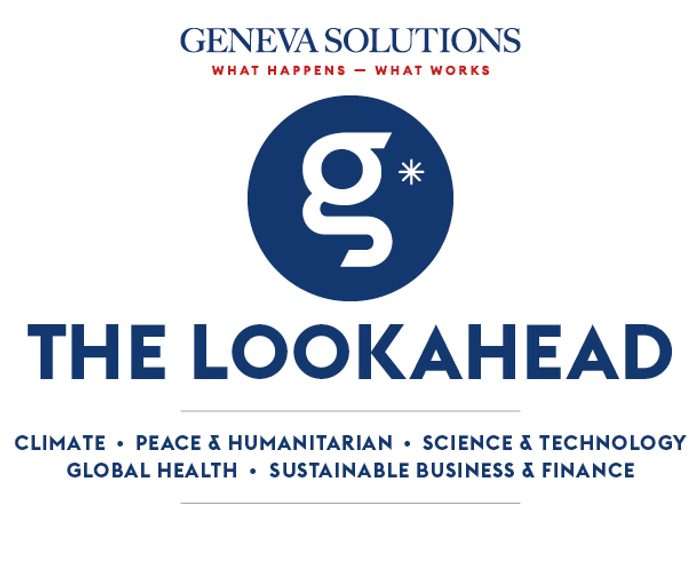Good morning, this is Michelle. Countries are months away from a two-year deadline to forge a treaty that tackles the global plastic crisis.
Ahead of another round of talks in Ottawa this week, campaigners are fretting about a small group of countries seeking to derail the process. |

|

People carry sacks of recyclable items to sell amid plastic and other debris washed ashore at Kedonganan Beach near Denpasar on Indonesia's resort island of Bali on 19 March 2024. (Keystone/Sonny Tumbaleka/AFP)
|
|
Campaigners brace for tense plastic treaty talks amid fears of sabotage.
As countries convene in Ottawa for negotiations on a future plastic pollution treaty, there's rising concern that a small yet determined group of states might try to obstruct progress. The talks, slated for 23 to 29 April, mark the fourth and second-last round of discussions before the end of 2024 deadline to hash out an agreement to curb the millions of tonnes of plastic waste released into the environment yearly.
Geneva Solutions
|
|
|
📋UNRWA REVIEW: WHAT NEXT.
The findings of an independent review group appointed to assess the UN Relief and Works Agency for Palestinian Refugees’ (UNWRA) neutrality, originally due on Saturday, are expected to be published this week. The review, ordered by UNRWA’s head Philippe Lazzarini, was announced early February after allegations by Israel that at least 12 agency workers were involved in the 7 October assault, sparking some of its biggest donors including the United States to freeze their funding.
|
|
Big decisions.
The outcome of the report and response to it in the coming weeks will be key for both financial and symbolic reasons in clearing UNRWA’s hobbled reputation. While some including Canada, Sweden and the European Union have resumed payments, others including Germany, which released funds in March for UNRWA’s regional work but not in Gaza, and Switzerland have been waiting for the review's outcome, led by France’s former foreign minister, before making a decision. The report will also likely lead to a divided response from within the US, which last month passed a bill to continue a ban on funding of UNWRA until 2025. Lazzarini has said the agency has enough funding to continue operations until the end of May.
|
|
Not so simple.
But even if more countries do restore their funding, the bigger question is whether Israel will allow UNRWA to continue to operate within Gaza and the West Bank. Last month, Lazzarini said Israel had told the UN that convoys would no longer be approved, while an Israeli government official cited by Reuters said they planned to phase out the use of UNRWA, accusing the agency of perpetuating the conflict. Meanwhile, on Thursday, the US alone vetoed a resolution at the Security Council to recognise the State of Palestine as a full state member, with Greenfield saying that Hamas’ control of Gaza made that impossible.
|
|
🥵TOO HOT TO WORK.
The International Labour Organization will release new statistics this morning on the dangerous effects of extreme heat on the health and safety of billions of workers worldwide. Climate change is poised to make heat waves longer, more intense, and more frequent, with heat-induced illnesses becoming an increasing occupational health hazard that employers will have to prepare for with better protection measures for employees, particularly outdoor workers, the ILO is expected to detail in its report.
|
|
Also on the agenda
-
📌 23-24 April | ILO Global Skills Forum.
The two-day event brings together representatives from around the world for a conversation about how to shape skills development in ever-changing economies and societies. ILO head Gilbert Houngbo and Nicolas Schmit, EU commissioner for jobs and social rights, will talk at the opening session on lifelong learning, promoting quality apprenticeships and investing in skills development.
ILO (EN)
-
📌 25 April | The role of international Geneva in “UN 2.0”.
An annual intergenerational dialogue organised by the association Greycells International, involving young and old experts and non-experts in multilateral affairs, this year’s discussion will question the future of multilateralism, particularly the role of the United Nations in Geneva. Speakers include Ignacio Packer, director of the Caux Initiatives of Change Foundation, and Sara Gugerli, president of the Swiss Diplomacy Students Academy.
Geneva Press Club (EN)
|
|
GS news is a new media project covering the world of international cooperation and development. Don’t hesitate to forward our newsletter!
Have a good day!
|

|
|
Avenue du Bouchet 2
1209 Genève
Suisse
|
|
|
|








